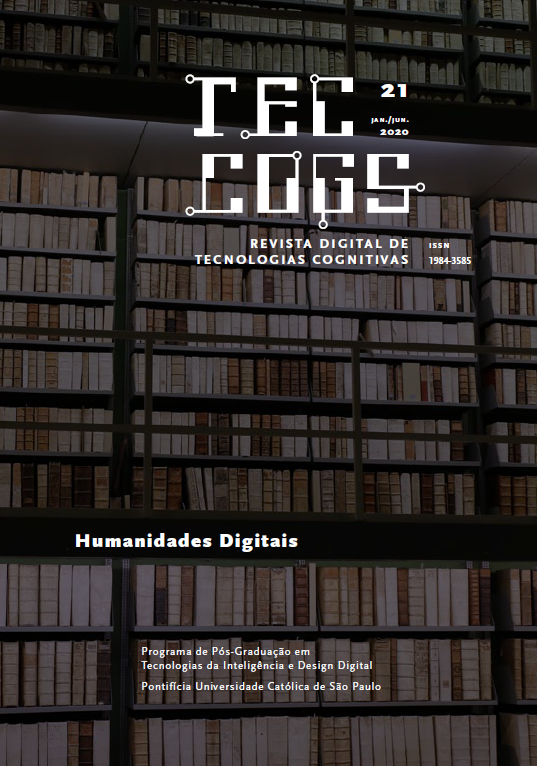Conceptual and technological foundations for megadata modeling in Digital Humanities: a case study in history of science text corpora
DOI:
https://doi.org/10.23925/1984-3585.2020i21p25-43Keywords:
History of science, Digital humanities, Knowledge organization and classification, Text corpora, Data modeling and mining, Computational linguisticsAbstract
The intense digitalization work done since the 1990s has made vast textual corpora available, including for remote access. More recently, new computer resources have been providing unprecedented possibilities for theoretical studies, also contemplating the modeling of megadata for the organization and classification of knowledge. The present case study is part of a larger framework of international cooperation, aimed at making research and documentary work in the history of science more effective. Specifically, its objective is to develop tools that allow the location and recognition of concepts common to groups of texts belonging to large databases in and for the history of science, as well as their change over time, with a view to their indexing and classification.References
Biblioteca CESIMA Digital. Disponível em: cesimadigital.pucsp.br. Acesso em: 25 jul. 2020.
Darwin Correspondence Project. Disponível em: darwinproject.ac.uk. Acesso em: 25 jul. 2020.
Darwin Manuscript Project. Disponível em: amnh.org/ourresearch/darwin-manuscripts-project. Acesso em: 25 jul. 2020.
Digital History And Philosophy Of Science. Disponível em: digitalhps.org. Acesso em: 25 jul. 2020.
History Of The Marine Biological Laboratory. Disponível em: history.archives.mbl.edu. Acesso em: 25 jul. 2020.
History Of The Max Planck Society. Disponível em: mpiwg-berlin.mpg.de/en/research/projects/DEPT1_458_HistMPS. Acesso em: 25 jul. 2020.
Poincaré Correspondence Project. Disponível em: poincare.univnancy2.fr. Acesso em: 25 jul. 2020.
Sobek. Disponível em: sobek.ufrgs.br. Acesso em: 25 jul. 2020.
Registres De L’académie. Disponível em: mpiwg-berlin.mpg.de/en/research/projects/DEPT1_458_HistMPS. Acesso em: 25 jul. 2020.
Research Coordination Network/National Science Foundation. Disponível em: digitalhps.org/node/184 nsf.gov/awardsearch/showAward?AWD_ID=1656284&HistoricalAwards=false. Acesso em: 25 jul. 2020.
Six Degrees Of Francis Bacon. Disponível em: mpiwg-berlin.mpg.de/en/research/projects/DEPT1_458_HistMPS. Acesso em: 25 jul. 2020.
Text Encoding Initiative Consortium. Disponível em: tei-c.org. Acesso em: 25 jul. 2020.
Downloads
Published
How to Cite
Issue
Section
License
Esta revista oferece acesso livre imediato ao seu conteúdo de acordo com a licença CC BY 4.0, em conformidade com a definição de acesso público do Directory of Open Access Journals (DOAJ).
Ao submeter um texto à TECCOGS, os autores asseguram que o material submetido à avaliação e eventual publicação não infringe de modo algum qualquer direito proprietário ou copyright de outros. Com a submissão, o autor transfere em efetivo os direitos de publicação do artigo para a TECCOGS. A transferência de copyright cobre os direitos exclusivos de publicação e distribuição do artigo, incluindo reimpressões ou quaisquer outras reproduções de natureza similar, além de traduções. Os autores mantém o direito de usar todo ou partes deste texto em trabalhos futuros de sua autoria e de conceder ou recusar a permissão a terceiros para republicar todo ou partes do texto ou de suas traduções. Para republicar números da revista na íntegra, qualquer interessado precisa obter permissão por escrito tanto dos autores como também dos editores da TECCOGS. A TECCOGS por si só pode conceder direitos relativos a emissões de periódicos como um todo.
Imagens com direitos autorais pertencentes a terceiros, que não foram concedidos ao autor do texto, devem ser utilizadas somente quando necessárias à análise e ao argumento da pesquisa, sempre indicando as respectivas fontes e autoria. A TECCOGS dispensa o uso de imagens meramente ilustrativas. Se desejar ilustrar um conceito, o autor deve indicar, em forma de URL ou referência bibliográfica, uma referência em que a ilustração esteja disponível.
---------------------------------------------------------------------------------
This journal offers free immediate access to its content under CC BY 4.0, in accordance with Directory of Open Access Journals' (DOAJ) definition of Open Acess.
When submitting a text to TECCOGS, authors ensure that the material submitted for evaluation and eventual publication does not infringe any proprietary right or copyright. Upon submission, authors effectively transfer the publication rights of the article to TECCOGS. The copyright transfer covers the exclusive rights of publication and distribution of the article, including reprints or any other reproduction of similar nature, in addition to translations. Authors retain the right to use all or parts of the text in future works of their own, as well as to grant or refuse permission to third parties to republish all or parts of the text or its translations. In order to fully republish issues of the magazine, anyone interested must obtain written permission from both the authors and the editors of TECCOGS. TECCOGS alone can grant rights relating to issues of journals as a whole.
Images whose copyright belongs to third parties that have not been granted to the author of the text should be used only when essential for the analysis and argument, always indicating theirs respective sources and authorship. TECCOGS dismisses any use of merely illustrative images. To illustrate a concept, the author must indicate, in the form of a URL or bibliographic reference, a source in which the illustration is available.


